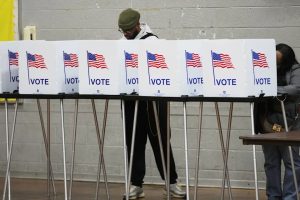Opinion – Government shutdown showdown takes a new turn

Senate Minority Leader Chuck Schumer (D-N.Y.) may be a prophet without honor. In mid-March, when Congress voted to fund the government for the remainder of fiscal 2025, Schumer and nine Democratic colleagues joined all but one Republican senator to provide sufficient votes (more than 60) to overcome the ongoing filibuster threat.
While Schumer and all but two of his Democratic colleagues then voted against the continuing resolution, it still had more than the 51 votes needed to pass. Schumer’s argument against the alternative of shutting-down the government was that things would be much worse if President Trump had free rein during a shutdown to fire government employees at will and discontinue government services and agencies he disliked. Nevertheless, Schumer’s stance infuriated a good number of his party cohorts, with rumblings of mutiny in the ranks.
Today’s government shutdown is now in its fourth week, and Schumer is fully back on board with his Senate Democratic colleagues. They oppose the “clean” continuing resolution passed by the House unless it also includes restoring the Affordable Care Act tax subsidies reduced by the administration. As it turns out, though, Schumer still holds the dubious distinction as his party’s prophet without honor for predicting what the president would do in the event of a government shutdown.
The president has authorized the Office of Management and Budget to eliminate 4,000 “non-essential” government jobs across eight agencies, with more to come. Additionally, billions in previously funded transportation and infrastructure projects are being rescinded. What this means is that when the government reopens with a new continuing resolution in place, it will not be a grand reopening but a significantly diminished one.
A U.S. district court judge in northern California reinforced a ruling last Friday that the president may not fire thousands of government workers without obeying due process guarantees in law. That ruling may or may not be sustained as it wends its way to the Supreme Court. The courts will play an increasing role in the current shutdown as hundreds of lawsuits have been brought by individuals directly affected by the administration’s efforts to circumvent statutory protections.
House Speaker Mike Johnson (R-La.) has predicted this may be the longest government shutdown in history — the previous record being 34 days during Trump’s first administration. That dispute involved funding the southern border wall. White House economic adviser Kevin Hassett, on the other hand, put a smiley face on prospects, telling CNBC in an interview Monday, “I think the Schumer shutdown is likely to end sometime this week.” That optimistic view was leveraged by the threat of harsher funding cuts in Democratic states and districts.
Senate Majority Leader John Thune (R-S.D.), has pledged to allow Democrats their vote on the ObamaCare tax subsidies after the continuing resolution has been enacted. But that offer has not yet been accepted by Schumer’s colleagues.
Theoretically, the support of House and Senate Republican majorities for the president’s unilateral funding cutbacks may qualify as small “d” democracy in practice. Two things that may (or may not) validate that assumption are public opinion and Congress’s ability to finesses constituent needs and national priorities.
Public opinion and politics go hand-in-glove though there is often a lot of finger-pointing and wrist twisting hidden in the mittens. The president’s powers of persuasion and direct pressures on members will wax and wane as members’ own political fortunes teeter on the brink of next year’s midterm elections.
President Trump has already responded to some of his party’s expressed concerns by transferring research and development funds in the Pentagon to pay the salaries of uniformed military personnel, and by temporarily restoring some of the funding for the Center for Disease Control’s missions that were being zeroed-out.
The American people seem to be inured by all this, having seen government shutdowns come and go like the seasons. The standard public response seems to be, it’s just politics as usual, compromises will be struck, and life will go on. However, any drying-up of resources affecting the broader public will eventually bear down on the constituents of individual members.
In previous government shutdowns, the assumption was always that once a shutdown showdown is resolved, the status quo ante would be restored and life would resume as before. Those assumptions may be dated given today’s shutdown in which government will not likely emerge and function as it once did. Those consequences will truly represent a turn of the screw on how our system of government will function and persevere in the future.
Don Wolfensberger is a 28-year congressional staff veteran culminating as chief-of-staff of the House Rules Committee in 1995. He is author of, “Congress and the People: Deliberative Democracy on Trial” (2000), and, “Changing Cultures in Congress: From Fair Play to Power Plays” (2018).
Copyright 2025 Nexstar Media, Inc. All rights reserved. This material may not be published, broadcast, rewritten, or redistributed.
For the latest news, weather, sports, and streaming video, head to The Hill.


